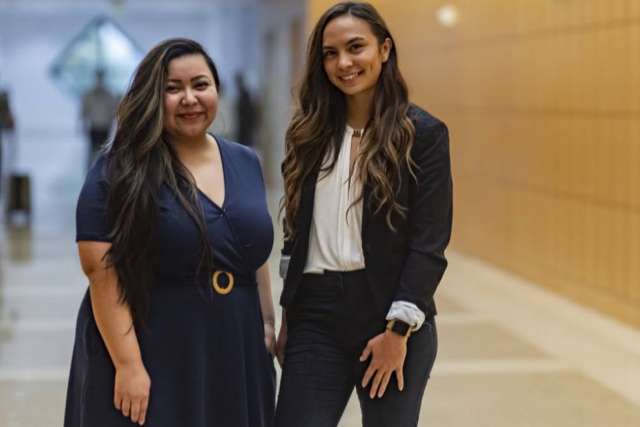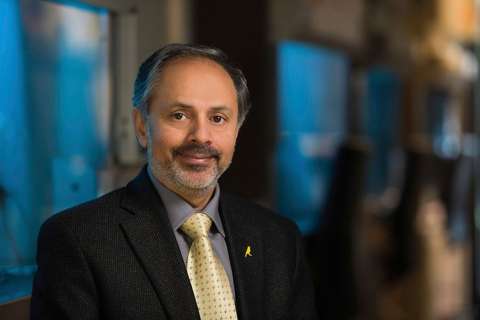Transformative.
That’s the word Dahlia Maldonado, BSN, RN-BC, used to sum up the pandemic during a listening tour conducted by the Office of the Surgeon General.
Maldonado, an administrative nurse in the medical surgical nursing unit at UCLA Santa Monica Medical Center, was among a group of front-line health care workers invited to speak about their experience providing care during the pandemic and to offer advice to the Surgeon General’s team about how to support their safety and well-being.
Nearly two dozen participants from across the country — including three nurses from UCLA Health — took part in the two sessions, held in October and November, 2021. Each was asked to respond to seven questions, which had been furnished to the participants in advance.
One of the questions asked was, “What one word or phrase sums up the pandemic for you?”
“My word was ‘transformative’ because I think that with great challenges also comes the opportunity to change,” Maldonado explains. “Something the health care system needs is change, and nurse-driven change should be at the forefront.”
Other questions included: What programs or policies were put in place to support your well-being? How are things now versus the start of the pandemic? What is or was the hardest thing about working in the pandemic? Is there something you’d like to say to people outside of health care? As you look back over the past 20 months, what are you most grateful for?
Shared experiences
The discussions were part of a broader listening tour the Office of the Surgeon General (OSG) organizedthat spans leaders, associations and front-line team members. The OSG’s overall goal is to use the insight gleaned from the listening tours to build a series of initiatives to ensure health care will better support the safety and well-being of health care members.
Kannitha Lor, BSN, RN, CCRN, a clinical nurse in the 7 Coronary Care Unit at Ronald Reagan UCLA Medical Center (RRUCLA) said hearing other nurses share their experiences validated much of what she’s been feeling over the past two years.
“There were people from different types of hospital systems throughout the country, and to be able to hear that everyone else is going through the same thing, whether in hospitals or long-term care facilities, was eye-opening,” Lor says.
William Eissler, MSN/MBA, RN, a clinical nurse in the Pediatric Intensive Care Unit at RRUCLA, agreed.
“Everything that the other clinicians talked about, I identified with and have gone through myself,” he says. “Everybody is just burned out and exhausted and praying for the pandemic to end.”
Eissler, who is co-chair of Nursing’s Structural Empowerment Council, says he appreciated the opportunity for nurses to give a unified message to “America’s doctor.”
“It was really a chance to speak up and come together to continue strong,” he says.
Advocates for change
Participants in the listening sessions were asked for their ideas on how government leaders could better support them. Responses included: combat misinformation; prove that science works; communicate thebalance of personal freedom and safety; demystify the vaccine; and connect with respected community members to communicate key messages around vaccines and science.
That resonated with Eissler, who says he fights a daily battle with parents who don’t understand why they need to get a test or get vaccinated to see their children.
'Everything that the other clinicians talked about, I identified with and have gone through myself. Everybody is just burned out and exhausted and praying for the pandemic to end.'
WILLIAM EISSLER, MSN/MBA, RN, A CLINICAL NURSE IN THE PEDIATRIC INTENSIVE CARE UNIT AT RONALD REAGAN UCLA MEDICAL CENTER
“I don’t know how to make it any clearer to them,” he says. “The Office of the Surgeon General has been putting out information, but it seems like there has to be a better way to get the right information out there. That’s something I hope the OSG could continue to address.”
Eissler says his other ask was that the OSG pressures Congress and the Senate to pass health care reform “so we have a system that actually helps people who need it.”
Lor, who serves as chair of the Professional Development Council, says she is hoping for a united government response and nationwide policy on staffing ratios, which California has but many states do not.
“It’s unsafe for patients. You can’t provide the best care. You’re overwhelmed,” she says, echoing the words of many of the session participants.
“Obviously, there is so much that is broken in the health care system,” Lor continues. “But I think better ratios is one thing we can definitely try to achieve.”
Supporting fellow nurses
Maldonado noted that in the listening session, there were many participants holding leadership roles in their organizations. She gives credit to UCLA Health for choosing bedside nurses to represent the face of health care.
“Being on the front line gives you a different perspective than being in a leadership position,” she says. “I think that showed great leadership from our hospital to make sure they are taking care of and supporting us.”
Maldonado’s biggest takeaway was the importance of advocating for one another during a time when the nursing shortage is greater than expected. She says she hopes action is taken as a result of the listening tours because the voices and needs of nurses must be heard.
“That’s something that we all expressed,” Maldonado says. “It’s been very hard to continue in this career. We’ve seen a lot of nurses leave.”
One bright spot during the past two years has been better teamwork, Lor says, which she noted during the listening session.
“I think everyone was able to come together and collaborate and focus on compassion and caring,” she says. “Even though there are lots of things that can be improved, I’m grateful to work with my coworkers.”
Jennifer Karmarkar is the author of this article.



